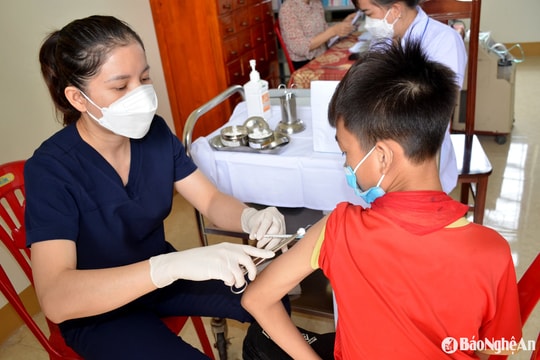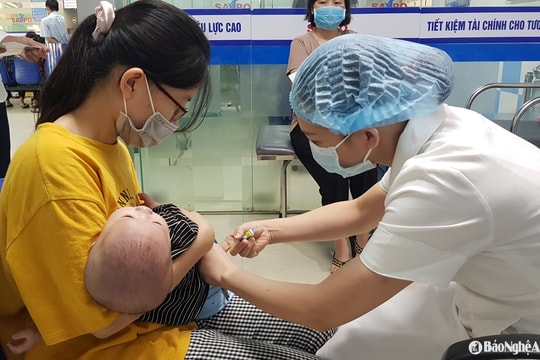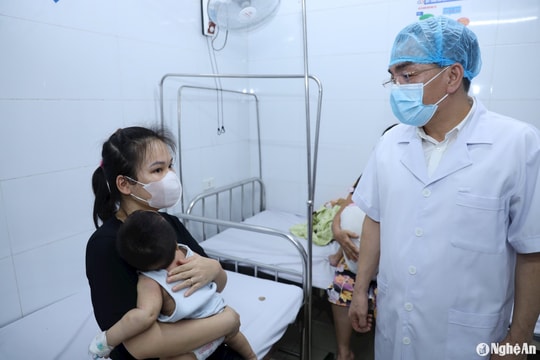3 diseases return to Vietnam due to lack of vaccination
In 2014, a measles outbreak in Vietnam caused thousands of children to become ill, nearly 150 died, of which 90% were not vaccinated.
Before 2014, an accident happened to 3 children in Quang Tri after being vaccinated with measles vaccine, causing panic among many families. Although the cause of the accident for the children in Quang Tri was due to the wrong injection, at that time, many people attributed the incident to the vaccine and decided not to vaccinate their children. According to the Ministry of Health at that time, the rate of children vaccinated against measles was very low, even in Hanoi, 90% of children with measles had not been vaccinated.
Professor Dang Duc Anh, Director of the National Institute of Hygiene and Epidemiology, Head of the National Expanded Immunization Project Management Board, said that the measles epidemic in 2014 broke out strongly, hundreds of thousands of children were suspected of having measles, more than 6,000 children were confirmed to have measles, nearly 150 children died. At that time, parents rushed to get their children vaccinated against measles, causing vaccination sites to be overloaded. The Ministry of Health also organized many measles vaccination campaigns for children up to 14 years old. Thanks to that, by 2016, measles cases were recorded at the lowest level in the past 10 years with just over 46 patients nationwide.
 |
| Vaccination is the best way to prevent disease. |
Two other diseases have recently re-emerged and claimed the lives of dozens of children, due to lack of vaccination: whooping cough and hepatitis B. In 2016, whooping cough returned, causing hundreds of children in Hanoi to be hospitalized, many of them died.
According to statistics from the National Expanded Immunization Project in Vietnam, the full vaccination rate for children under 1 year old reached 98% in 2016. However, the whole country still has 550,000 children who have not received the newborn dose of hepatitis B vaccine, 62,000 children who have not received 3 doses of DPT vaccine (diphtheria - pertussis - tetanus), 79 districts have the 3rd dose DPT vaccination rate below 90%.
In a recent workshop, Dr. Duong Thi Hong, Deputy Director of the Central Institute of Hygiene and Epidemiology, said that the focus of vaccination work in the coming time is that Vietnam needs to increase the rate of hepatitis B vaccination within 24 hours to achieve the goal of controlling hepatitis B in 2017. The rate of hepatitis B vaccination within the first 24 hours of 2016 reached 68%, but there are still 15 provinces with a low rate, below 50%.
According to Dr. Hong, people have recently lost confidence due to a number of incidents of infants dying after receiving the hepatitis B vaccine, although medical experts have determined that the cause was not the vaccine. Therefore, many parents are still hesitant to vaccinate their children.
Recently appearedMany individuals and groups call for anti-vaccination and cite foreign studies on the harmful effects of vaccines. For example, they cite a survey of homeschooled communities in the US on vaccinations, which shows that, compared to unvaccinated children, vaccinated children are 2.4 times more likely to have chronic diseases and 2.9 times more likely to have eczema. Vaccinated children are 4.2 times more likely to have autism, 5.2 times more likely to have learning disabilities, and 30 times more likely to have allergic rhinitis than unvaccinated children.Many mothers also shared that they do not let their children get vaccinated and ""Thank goodness I'm very healthy."
According to Associate Professor Phan Trong Lan, Director of the Pasteur Institute in Ho Chi Minh City, studies in the US and UK that claim vaccines cause autism or epilepsy in children have been proven to be incorrect. In fact, these babies all suffered from other diseases. The author of this study was even found by the court to have falsified data and had a personal conflict of interest. A research result blaming vaccines had to be withdrawn from a newspaper even though it had been published for 10 years. "The rate of adverse events caused by vaccines is very low compared to the great benefits it brings to the community," Associate Professor Lan said.
Dr. Truong Huu Khanh, Head of the Department of Infectious Diseases at Children's Hospital 1, also warned: "Not vaccinating your child is a crime against the country and a generation." According to Dr. Khanh, if your child is not vaccinated but is still healthy, it is partly due to luck, and partly due to living in a community with a low risk of infection. However, if your child is exposed to a high-risk area, the possibility of infection is higher than that of a vaccinated child.
According to Professor Dang Duc Anh,Vaccination under the expanded immunization program is not only voluntary but also mandatory under the Law on Prevention and Control of Infectious Diseases. If children are not vaccinated, they will be at high risk of contracting the disease and spreading it in the community.
After more than 30 years of implementing the expanded immunization program, more than 600 million doses of vaccine have been given free of charge to children and women. Thanks to that, the morbidity and mortality rates of dangerous infectious diseases with preventive vaccines have been reduced by hundreds to thousands of times. 2016 is the 16th consecutive year that Vietnam has protected its achievements in eradicating polio and the 11th year that the country has maintained its achievements in eliminating neonatal tetanus. Many diseases in the world have been almost eradicated thanks to vaccines, such as smallpox.
According to VNE
| RELATED NEWS |
|---|





